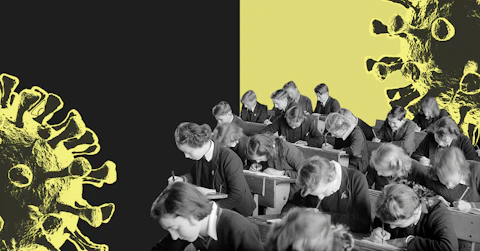“If we don’t come together and vote—vote—we’re going to be in a hell of a mess,” one 70-year-old woman said.
Temperatures were in the 30s in Raleigh, North Carolina, on Saturday morning, but that didn’t stop thousands of people from gathering downtown for the 14th annual Historic Thousands on Jones Street march and rally.
Bundled up and carrying signs that read “Fight for 15,” “Respect Our Vote,” and “We All Belong,” attendees marched to the old Capitol building to make their voices heard on a number of issues, including affordable health care, livable wages, and immigration rights.
Hosted by the North Carolina chapter of the NAACP and Poor People’s Campaign: A National Call for Moral Revival, the annual event also known as the Mass Moral March was started in 2007 by then-state NAACP president the Rev. William Barber. With support from more than 200 groups, it has since transformed into a platform to advocate for a 14-point “People’s Agenda” that includes promoting environmental justice and well-funded, diverse public schools.
The theme of this year’s march and rally focused on the power of voting.
“I’m tired of crying. I’m tired of mourning, and I’m going to fight with love,” Barber told the crowd on Saturday, which organizers estimate was about 30,000. “I’m going to fight with truth. I’m going to fight with marching. I’m going to fight at the ballot box. … It’s time to vote. It’s time to intensify and embolden your agitation.”
Participants hailing from Wilmington to Salisbury waved signs, cheered, and raised their hands in solidarity as they listened to speakers share their stories about why voting is important. Lack of affordable healthcare and racial discrimination were common themes.
COURIER talked with several attendees about why they marched on Saturday.
Kathryn Vandergrift, 27, of Raleigh and Kendra Johnson, 48, of Durham
“We believe that we’re stronger standing together as a community,” Johnson said, “and we know that the LGBTQ community is facing the same set of problems that Black and brown [communities], immigrant communities, women, the resource-poor, are to access education, health care, a fair workplace … It’s about us building together to create the world that we want to see.”
Vandergrift echoed those sentiments. “We are here to stand with everybody who feels that they are not being represented … and we’re here to let those who like it that way know that we are going to be fighting back.”

Larsene Taylor, 70, of Goldsboro
Saturday’s march and rally was the 12th that Taylor has attended. “I was at the very first one and I got involved because of … collective bargaining for public employees, that was my baby at the time,” she said.
“This is my heart right now,” she continued, pointing to a pin on her sweatshirt. “Coal ash.” She also shared concerns about the “the war on Black America.”
“If we don’t come together and vote—vote—we’re going to be in a hell of a mess. This is no time for division, we need to come together as a nation and vote for our rights. I’m telling you, we’re going to be in trouble if we don’t get [President Trump] out of there. …We’ve got to do what we’ve got to do. Whatever part I need to play, that’s what I intend to do.”

Dr. Howard Eisenson, 66, of Durham
Eisenson, a primary care doctor with 40 years of experience, marched with a group of fellow medical professionals all wearing white coats. “We feel like it’s our professional responsibility to advocate for the health and well-being of our communities. People will not achieve their potential for health and well-being unless we address social justice, unless we address disparities. Issues like adequate employment, affordable housing, food, women’s rights, immigrant rights, LGBT rights, and criminal justice reform are all so relevant to achieving a level playing field and helping everyone achieve good health.”





